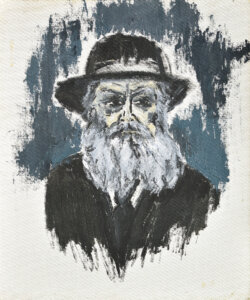How a ‘lowly Orthodox,’ punk rock lesbian ended up in Hasidic Crown Heights
Rossi’s memoir ‘Punk Rock Queen of the Jews’ tells a story ripe for Passover

Rossi now and, on the cover of her memoir, during her time in high school (before being shipped out to Crown Heights). Photo by She Writes Press/Canva
Chef Rossi is confident she is the only person I’ll ever speak with who’s eaten kishka and grits for dinner. She may also be the only person who ever greeted Chabad leader Rabbi Menachem Mendel Schneerson with a hearty “Hiya, Rebbe!”
Brought up “lowly Orthodox” in Rumson, New Jersey, Slovah Davida Shana bas Hannah Rachel Ross grew up in a kosher home, but was allowed to order Big Macs (with coupons, without the meat). In high school she was a rebel, moving out of her parents’ house at 16 to live in a hotel. But when the cops busted a party there, her folks sent her to Crown Heights to live with a Chabad rabbi known for taking in young, wayward Jews who fell in with cults like the Moonies.
Rossi wasn’t in a cult — just smoking, doing theater and hanging out with a crowd her parents deemed to be bad influences. Regardless, she had to stay in the neighborhood, under the supervision of the rabbi her parents paid, until she became a legal adult.
Her time as an unwilling ba’al teshuva is the subject of Rossi’s new memoir, The Punk Rock Queen of the Jews. Rossi’s previous memoir, 2015’s The Raging Skillet, about how she founded her catering company, touched briefly on her time on Kingston Avenue, where she was made to swap her Sex Pistols T-shirt for a maxi skirt. The new book tells the fuller story, going deeper on Rossi’s coming out as a lesbian, the misogyny she endured in the Hasidic community and a time she was sexually assaulted by a friend who she later encountered on a book tour.
The followup — a kind of prequel — took years to come together.
“I’ve always had my mother’s voice in my head the whole time. ‘Don’t do it if it’s bad for the Jews,’” Rossi said in a phone interview. But after time passed, Rossi was no longer worried that her story would be steering the narrative or giving bigots ammunition.
Instead the book, while unsparing in its critique of the many ostensibly pious people in the Haredi world who were, behind closed doors, abusive, recognizes the people in that enclave who looked out for her.

One Haredi advocate welcomed Rossi as a much-needed bit of “meshugga” in the neighborhood, and she wasn’t afraid to peek behind curtains — to discover rabbis smoking pot in the back of a kosher pizza spot — or find loopholes around modesty. She objected to being restricted to the women’s balcony in shul and the way men would often treat her as invisible when she went to buy groceries. (She also learned that many yeshiva boys, not allowed near women, would hook up with other men.)
Culinarily, that pot-filled kosher pizza joint, with its Middle Eastern and Italian offerings — combined with her mother’s care packages of Hebrew National hot dogs — helped guide Rossi into her ultimate career as an “anti-caterer” who famously served anatomically correct amuse-bouches for a Vagina Monologues afterparty.
These days, Rossi is a member of the progressive, non-denominational Manhattan synagogue Congregation Beit Simchat Torah, a return to Judaism she didn’t anticipate after fleeing Crown Heights when she turned 18.
“I just didn’t want anything to do with anything Jewish,” Rossi said of when she left the Lubavitchers behind in the 1980s. “I wanted to run madly in the opposite direction.”
At CBST, known for its vibrant queer community, she was able to find a form of worship that spoke to her. On the first night of Passover this year, she attended their Seder, taking a break from catering her own. (Yes, even professional caterers get overwhelmed making a Seder.)
Rossi still stays kosher in her own way — she will consume a Cuban-style turkey sandwich, the meat and cheese on separate pieces of bread and have a mojito in between, which she figures kashers her system. While she’s known for BBQ pork, peanut butter bacon sandwiches and pernil, she’s never eaten anything that came from a pig. (Her mother told her a story about a Spanish forebear who, refusing to eat pork under the direction of Queen Isabella, was burned alive — accordingly Rossi’s mom, Harriet, said if she ever ate pork she’d smell her ancestors burning.)
Over the years Rossi has lost touch with many of the women she lived with in Crown Heights, young people who hailed from France, South Africa and Israel. She’s hopeful the book will find them, wherever they may be.
Rossi will be having an official book launch at Powerhouse Arena in Brooklyn April 25, with kosher for Passover champagne and “matzo crack” — shards of the bread of affliction coated in caramel, chocolate, pecans and sea salt. As a concession to the binding nature of the holiday, the matzo will be high fiber.
The timing of the book’s release, on the first day of Passover, was no accident. Its working titles included Exodus From Kingston Avenue and Exodus from Crown Heights.
“It’s a whole story about my Exodus and here we are in the Exodus,” she said.






















